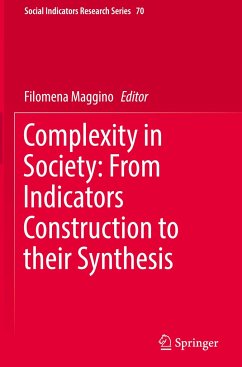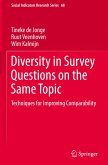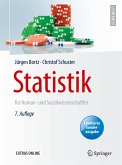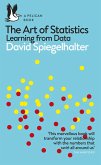Complexity in Society: From Indicators Construction to their Synthesis
Herausgegeben:Maggino, Filomena
Complexity in Society: From Indicators Construction to their Synthesis
Herausgegeben:Maggino, Filomena
- Gebundenes Buch
- Merkliste
- Auf die Merkliste
- Bewerten Bewerten
- Teilen
- Produkt teilen
- Produkterinnerung
- Produkterinnerung
This volume discusses the many recent significant developments, and identifies important problems, in the field of social indicators. In the last ten years the methodology of multivariate analysis and synthetic indicators construction significantly developed. In particular, starting from the classical theory of composite indicators many interesting approaches have been developed to overcome the weaknesses of composites. This volume focuses on these recent developments in synthesizing indicators, and more generally, in quantifying complex phenomena.
Andere Kunden interessierten sich auch für
![Excel 2013 for Educational and Psychological Statistics Excel 2013 for Educational and Psychological Statistics]() Thomas J. QuirkExcel 2013 for Educational and Psychological Statistics53,49 €
Thomas J. QuirkExcel 2013 for Educational and Psychological Statistics53,49 €![Diversity in Survey Questions on the Same Topic Diversity in Survey Questions on the Same Topic]() Tineke de JongeDiversity in Survey Questions on the Same Topic67,99 €
Tineke de JongeDiversity in Survey Questions on the Same Topic67,99 €![Data Science and Social Research Data Science and Social Research]() Data Science and Social Research119,99 €
Data Science and Social Research119,99 €![The Frontiers of Applied Demography The Frontiers of Applied Demography]() The Frontiers of Applied Demography106,99 €
The Frontiers of Applied Demography106,99 €![Statistik für Human- und Sozialwissenschaftler Statistik für Human- und Sozialwissenschaftler]() Jürgen BortzStatistik für Human- und Sozialwissenschaftler53,49 €
Jürgen BortzStatistik für Human- und Sozialwissenschaftler53,49 €![The Palgrave Handbook of Survey Research The Palgrave Handbook of Survey Research]() The Palgrave Handbook of Survey Research165,99 €
The Palgrave Handbook of Survey Research165,99 €![The Art of Statistics The Art of Statistics]() David SpiegelhalterThe Art of Statistics9,49 €
David SpiegelhalterThe Art of Statistics9,49 €-
-
-
This volume discusses the many recent significant developments, and identifies important problems, in the field of social indicators. In the last ten years the methodology of multivariate analysis and synthetic indicators construction significantly developed. In particular, starting from the classical theory of composite indicators many interesting approaches have been developed to overcome the weaknesses of composites. This volume focuses on these recent developments in synthesizing indicators, and more generally, in quantifying complex phenomena.
Produktdetails
- Produktdetails
- Social Indicators Research Series 70
- Verlag: Springer / Springer International Publishing / Springer, Berlin
- Artikelnr. des Verlages: 978-3-319-60593-7
- 1st ed. 2017
- Seitenzahl: 344
- Erscheinungstermin: 14. August 2017
- Englisch
- Abmessung: 241mm x 160mm x 23mm
- Gewicht: 711g
- ISBN-13: 9783319605937
- ISBN-10: 3319605933
- Artikelnr.: 48187569
- Herstellerkennzeichnung
- Springer-Verlag GmbH
- Tiergartenstr. 17
- 69121 Heidelberg
- ProductSafety@springernature.com
- Social Indicators Research Series 70
- Verlag: Springer / Springer International Publishing / Springer, Berlin
- Artikelnr. des Verlages: 978-3-319-60593-7
- 1st ed. 2017
- Seitenzahl: 344
- Erscheinungstermin: 14. August 2017
- Englisch
- Abmessung: 241mm x 160mm x 23mm
- Gewicht: 711g
- ISBN-13: 9783319605937
- ISBN-10: 3319605933
- Artikelnr.: 48187569
- Herstellerkennzeichnung
- Springer-Verlag GmbH
- Tiergartenstr. 17
- 69121 Heidelberg
- ProductSafety@springernature.com
Professor of Social Statistics and Multivariate Statistical Analysis at the University of Florence. Coordinator of the International II level master "QoLexityMeasuring, Monitoring and Analysis of Quality of Life and its Complexity" (University of Florence). Her main research interests concern: (i) data production (in particular, subjective data assessment), (ii) data analysis (in particular, multivariate and dimensional analysis, scaling models and construction of composite and synthetic indicators), and (iii) data presentation and dissemination (with particular reference to defining a model aimed at assessing the quality of communication in statistics). Main field of application is quality-of life and wellbeing measurement and analysis. She is author of many publications on those topics. President of the Italian Association for Quality-of-Life Studies (AIQUAV). Past-president of the International Society for Quality-of-Life Studies (ISQOLS). Component of the Global Project Research Network on Measuring the Progress (established at OECD). Component of the Scientific Committee for the Measurement of Wellbeing (Commissione scientifica per la misura del benessere) established at Italian National Institute of Statistics (ISTAT). Component of the Expert Group on Quality of life, established at Eurostat - European Commission. She cooperates with and is advisor of the Italian National Institute of Statistics (ISTAT) with reference to quality-of-life and wellbeing issues. She is member of several international associations, many scientific journals' editorial board, scientific committees and session organizer/chair of numerous international conferences. Editor-in-Chief (from 01/01/2014) of Social Indicators Research journal (Springer).
Part I. Conceptual issues.- Chapter 1. Epistemology of Complexity (Alberto Peruzzi).- Chapter 2. Building Knowledge. Between Measure and Meaning: A Phenomenological Approach (Rocco Sacconaghi).- Part 2. Methodological Issues.- Chapter 3. Socio-Economic Statistics for A Complex World: Perspectives and Challenges in the Big Data Era (Marco Fattore).- Chapter 4. Developing Indicators and Managing the Complexity (Filomena Maggino).- Chapter 5.- Dealing with Syntheses in a System of Indicators (Filomena Maggino).- Chapter 6. Scalability of Composite Indices: Complexity Complications (Kenneth C. Land, Vicki L. Lamb, Xiaolu Zang).- Part 3. Technical Issues.- Chapter 7. Synthesis of Indicators: The Composite Indicators Approach (Matteo Mazziotta & Adriano Pareto).- Chapter 8. Synthesis of Indicators: The Non-Aggregative Approach (Marco Fattore).- Chapter 9. The Role of Extended IRT Models for Composite Indicators Construction (Michela Gnaldi, Simone Del Sarto & Filomena Maggino).- Part 4. Particular Experiences.- Chapter 10. Synthesis of Indicators Through Weighting: The Experiences of Quality of Life Measures (Chang-Ming Hsieh).- Chapter 11. The Role of Normalization in Building Composite Cndicators. Rationale and Consequences of Different Strategies (Ludovico Carrino).- Chapter 12. Steps Towards a Synthetic Measure Derived from a Partially Ordered Set (Giovanna Boccuzzo & Giulio Caperna).- Chapter 13. Joint analysis of Structural Models and Performance: Merging Clustering and Composite Indicators in the Analysis of Europe 2020 strategy (Tommaso Rondinella & Elena Grimaccia).
Part I. Conceptual issues.- Chapter 1. Epistemology of Complexity (Alberto Peruzzi).- Chapter 2. Building Knowledge. Between Measure and Meaning: A Phenomenological Approach (Rocco Sacconaghi).- Part 2. Methodological Issues.- Chapter 3. Socio-Economic Statistics for A Complex World: Perspectives and Challenges in the Big Data Era (Marco Fattore).- Chapter 4. Developing Indicators and Managing the Complexity (Filomena Maggino).- Chapter 5.- Dealing with Syntheses in a System of Indicators (Filomena Maggino).- Chapter 6. Scalability of Composite Indices: Complexity Complications (Kenneth C. Land, Vicki L. Lamb, Xiaolu Zang).- Part 3. Technical Issues.- Chapter 7. Synthesis of Indicators: The Composite Indicators Approach (Matteo Mazziotta & Adriano Pareto).- Chapter 8. Synthesis of Indicators: The Non-Aggregative Approach (Marco Fattore).- Chapter 9. The Role of Extended IRT Models for Composite Indicators Construction (Michela Gnaldi, Simone Del Sarto & Filomena Maggino).- Part 4. Particular Experiences.- Chapter 10. Synthesis of Indicators Through Weighting: The Experiences of Quality of Life Measures (Chang-Ming Hsieh).- Chapter 11. The Role of Normalization in Building Composite Cndicators. Rationale and Consequences of Different Strategies (Ludovico Carrino).- Chapter 12. Steps Towards a Synthetic Measure Derived from a Partially Ordered Set (Giovanna Boccuzzo & Giulio Caperna).- Chapter 13. Joint analysis of Structural Models and Performance: Merging Clustering and Composite Indicators in the Analysis of Europe 2020 strategy (Tommaso Rondinella & Elena Grimaccia).








